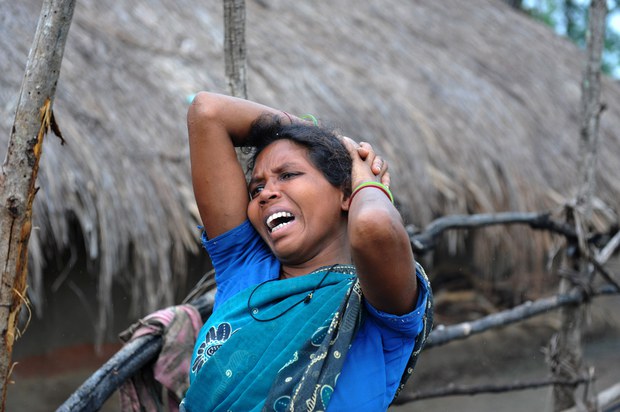India: Activists See Hope for Victims of Police Brutality in Maoist Belt
2017.01.10
Guwahati, India
 A tribal woman from the insurgency-stricken Indian state of Chhattisgarh weeps for her husband after he was killed in an encounter in a local district, July 7, 2012.
A tribal woman from the insurgency-stricken Indian state of Chhattisgarh weeps for her husband after he was killed in an encounter in a local district, July 7, 2012.
A move by India’s rights watchdog to hold Chhattisgarh state “liable” for the alleged rape and sexual assault of at least 16 tribal women by security forces will give a glimmer of hope to victims of police brutality in the country’s Maoist belt, activists said.
The National Human Rights Commission (NHRC) on Saturday sent a notice to the government of the insurgency-stricken central Indian state, holding it liable for the alleged crimes committed in 2015 and asking Chhattisgarh officials why it should not recommend 3.7 million rupees ($54,209) in interim damages to the 16 victims.
The human rights body said it intended to recommend 300,000 rupees ($4,395) to each of the eight rape victims, 200,000 rupees ($2,930) each to six sexual assault victims and 50,000 rupees ($732) to two victims of physical assault.
Activists allege that security forces have long brutalized tribal women and men with complete immunity in the name of combating Maoist rebels in the resource-rich forested regions of central and eastern India, known as the “Red Corridor.”
“With the NHRC for the first time taking note of the worst kind of human rights violations taking place in the country in the name of fighting insurgency, there is now finally a ray of hope for justice,” Kavita Srivastava of the People’s Union of Civil Liberties told BenarNews.
“The NHRC notice to the state government is a silver lining in the tragedy that is unfolding against the tribals and government dissenters,” she said.
Maoists, also known as Naxalites, have been fighting Indian security forces since the late 1960s from jungle hideouts in more than a third of central and eastern India’s 600 districts.
The armed rebels, who are inspired by Chinese revolutionary leader Mao Zedong, have accused successive governments of uprooting poor and landless people to exploit mineral-rich forests scattered throughout the region.
Although the level of violence has declined sharply in recent years, the group stages occasional attacks on security forces and police informers.
Government liable
The NHRC said it held the Chhattisgarh state government “vicariously liable” for the rape, sexual and physical assault of at least 16 tribal women after it concluded its investigation into reports that police attacked several villages in Bijapur district during an anti-Maoist operation in October 2015.
The rights body said it initiated investigations based on a news report, in which women from five villages accused the state police of sexually assaulting more than 40 of them and gang-raping at least two. Although the police launched a probe into the allegations, no arrests had been made so far, it added.
The NHRC said it was in the process of recording testimonies of 20 more victims who were sexually assaulted during the operation.
A special police team has been formed to investigate the alleged incidents, B.K. Singh, Chhattisgarh police public relations officer, told BenarNews.
“We have received the NHRC notice, and a team from the Criminal Investigations Department (CID) is investigating the alleged cases of sexual assault and rape. We will take appropriate steps and reply to the notice only after studying the findings of the CID team,” Singh said.
Police highhandedness
Activists often accuse Chhattisgarh police of routinely harassing not just tribe people, but journalists and human rights workers who try to expose incidents of police brutality.
In November, state police brought abetment to murder charges against two New Delhi-based academics who were part of a fact-finding team that highlighted police brutalities against tribal women in May 2016.
The police alleged that Nandini Sundar, a sociology professor at Delhi University, Archana Prasad, an anthropology professor at Delhi’s Jawaharlal Nehru University (JNU), and four other left-wing activists ordered the Nov. 4 killing of Samnath Baghel, who was part of a vigilante group opposed to Maoist rebels.
The police came under criticism for fabricating the charges after Baghel’s widow denied involvement of the two professors and the four left-wing activists.
Although none of the accused in Baghel’s killing has been placed under arrest yet, Chhattisgarh police late last month arrested seven human rights activists who were part of a fact-finding team enquiring into rising cases of extra-judicial killings in the state’s Bastar region.
The police alleged that the activists were acting as a cash conduit for Maoists, a charge denied by the accused.
“The NHRC should also do some public hearings in various districts of Chhattisgarh to put on record the crimes committed by security forces. The basis of its findings can be used for legal intervention and pressurizing the government to take action in all these excesses committed in the guise of fighting insurgency,” JNU’s Prasad told Benarnews.
“The police have been using all forms of pressure tactics to silence journalists, activists, lawyers and academics working in the Maoists belts in the country. And they are working with impunity as they have complete support of the state and central government,” Prasad said.







